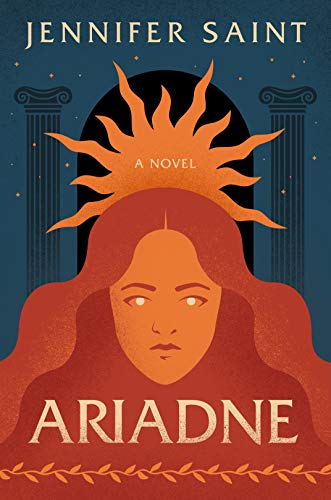Ariadne

“eminently readable, and its emotional effects linger beyond the last page.”
Ariadne is a footnote in Greek mythology. She was the sister of the Minotaur, the spy who betrayed the labyrinth’s secrets to Theseus. This minimal profile is fairly typical for women in mythology. Ancient Greece wasn’t a woman’s world, and even its myths leave women at the margins. “Proper” women, proverbially, were seen in public only twice: on the day they were married and the day they were buried. Goddesses had greater freedom, but mythological women, with their mixed divine and mortal heritages, peer out from the shadows.
Jennifer Saint’s first novel repositions Ariadne as the hero of her own story, which runs parallel to the thread of myth. This isn’t a new approach. The last two decades have been punctuated by re-imaginings of women’s lives in Greek myth, from Margaret Atwood’s The Penelopiad and Madeline Miller’s Circe to Pat Barket’s The Silence of the Girls and The Women of Troy (which re-center the mortal women of the Iliad). Such novels may be effective precisely because female characters of Greek myth are so marginal: There’s room for psychological development and space for human depth. It’s a field that’s still fertile, and Ariadne grows well in it.
Ariadne is the daughter of Minos, king of Crete, and Pasiphae, who was cursed by Poseidon to mate with a bull and birth the Minotaur. The Minotaur is the youngest child of many, a carnivorous child whose monstrousness explodes his family. Few families are so confronted with their mother’s sexuality, and rarely are the consequences so dire.
Ariadne turns inward, dancing on the beautiful floor built by Dedalus, the great artisan, and avoiding her father. When Minos conquers Athens and the children are bought to be fed to the Minotaur, her trauma is even greater. Theseus finally arrives, a mythic hero, seeking to fight and kill the Minotaur, and Ariadne is seduced by his heroism. She surrenders the knowledge of the Labyrinth and prepares to flee with Theseus and her sister Phaedra.
Key to this story, though, is Theseus’ betrayal. Theseus is one of the great mythic heroes of ancient Greece. Like Hercules, he battles monsters, undertakes great quests, and dominates his world. He leaves Phaedra behind, returning to marry her years later, and soon casts off Ariadne. He has no use for a girl who would betray her father, as Ariadne does, and so, inevitably, he abandons her to die.
Instead of death, though, Ariadne finds the god Dionysus, outsider among the Olympians, and becomes his wife and high priestess. She lives in isolation on an island between Crete and Athens, unbothered by the outside world. Phaedra, unaware of her sister’s fate, makes Theseus a more palatable wife. But Phaedra finds Theseus as disappointing and untrustworthy as her sister did, and even without knowing of his betrayal, comes to hate her husband and children.
Ariadne and Phaedra both represent feminine failure in Greek mythology. Ariadne fails as a daughter, Phaedra as a wife and mother. In disappointing their society’s most basic expectations, they ironically become more sympathetic to modern readers: they’re characters driven by individualism in a collectivist context, which makes them far more like us than the mythic characters who surround them.
Beyond this re-framing, Ariadne doesn’t challenge its source material. Saint doesn’t offer Ariadne or Phaedra (who share the first-person narration) a long historical perspective, or a chance to consider the nature of myth; nothing meta-textual occurs. The story relies instead on sympathy: the sympathy between ancient women subject to a violent patriarchal society, and the sympathy between modern readers and ancient individuals seeking to exist in ways that their societies don’t condone. The resulting novel isn’t deeply provocative, but it’s eminently readable, and its emotional effects linger beyond the last page.